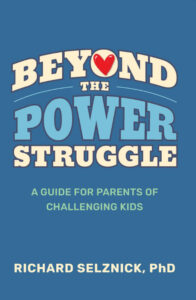 My marketing manager (my daughter Julia) has been pushing me to create more short videos to spread around.
My marketing manager (my daughter Julia) has been pushing me to create more short videos to spread around.
So, as a change of pace here are two that were posted to YouTube. TRUST ME. THEY ARE VERY SHORT!!!! Hope you enjoy. Let me know what you think.
The first one was posted a little while ago. It’s a brief introduction to the purpose of these videos:
1. Introduction: Selznick Video Productions!
The second is adapted from my new book, “Beyond the Power Struggle: A Guide For Parents of Challenging Kids.” It’s one of my favorite tips.
2. Challenging Children? Have a Mantra.
Feel free to make comment below.
To receive future blog posts, register your email: https://shutdownlearner.com.
To Contact Dr. Richard Selznick for advice, consultation or other information, email: shutdownlearner1@gmail.com.

 Copyright, Richard Selznick, Ph.D. 2023, www.shutdownlearner.com.
Copyright, Richard Selznick, Ph.D. 2023, www.shutdownlearner.com.

 Let’s say your 12-year-old sixth grader spells the following words:
Let’s say your 12-year-old sixth grader spells the following words: A common concern raised by parents (well, mostly the moms) is their child’s lack of what they label as “executive function deficits (EFD).”
A common concern raised by parents (well, mostly the moms) is their child’s lack of what they label as “executive function deficits (EFD).” Parents do various back flips to address meltdowns and school avoidance.
Parents do various back flips to address meltdowns and school avoidance.